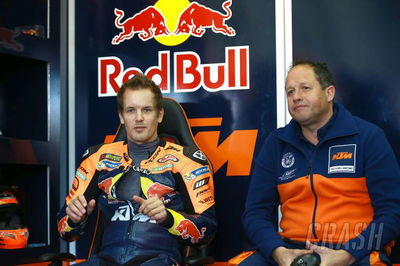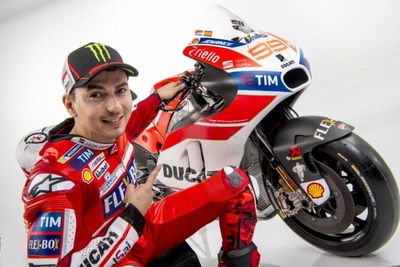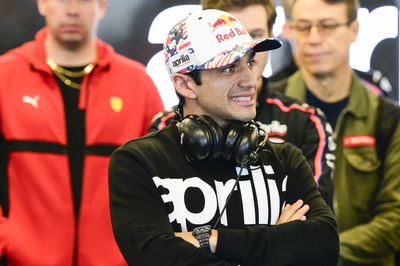Paul Trevathan (Espargaro's KTM crew chief) - Q&A

On a bright afternoon in early August, high up in the opulent surroundings of the Red Bull Ring media centre, KTM's Stefan Pierer could be found outlining his hopes for the Austrian company's much-anticipated venture into MotoGP.
With the stunning views of the revamped Spielberg venue complimenting the usual optimistic platitudes expressed at team launches, the extent of the company's CEO's lofty aims caught a few in attendance off guard.
"We are committed to pursuing the goal of a MotoGP title, even if it takes ten years," said Pierer. Some aim for a manufacturer that is new to the premier class of motorcycle racing, a brief and unsuccessful sojourn in 2005 aside.
Ten years and challenging for a world title may seem some distance away, but early impressions of KTM's project strengthen the impression that Pierer is utterly serious.
Be it when recruiting two high-level riders in Bradley Smith and Pol Espargaro for 2017, to appointing Mike Leitner - ex-crew chief of Dani Pedrosa - to head the MotoGP project, which led to the subsequent capturing of a number of HRC's engineers and technicians, one cannot doubt the ambition on display.
One of those appointments, Paul Trevathan, crew chief to Espargaro, is all-too-aware of that zeal. An ex-motocross racer, Trevathan was an Ohlin's suspension technician in MotoGP for nine years, before joining KTM at the close of 2014. In these two years, he has seen enough to suggest the Austrian marque - backed to the hilt by energy drink goliath Red Bull - will leave no stone unturned as it prepares to improve its RC16 sufficiently for Qatar.
Speaking in Jerez during a November test, Trevathan - crew chief to test rider Mika Kallio during KTM's Valencia wild-card - details his impressions of the KTM environment, working with 2017 rider Pol Espargaro, and own methods for problem solving...
Question:
It seems like KTM have been testing and preparing forever so where is the team at now after this last November test?
Paul Trevathan:
I think we've shown now that we have a certain pace. In my opinion we have a very balanced package with the RC16 and a good thing is that all three riders we have are pinpointing the same thing that we're missing. It is something we suspected earlier but we wondered if the new guys would think the same. It didn't stop development but we did hold back a little bit until the new guys tried the bike and we could be sure we were going in the right direction. We have a clear target and the riders are saying that if we touch this particular area then the difference will be felt immediately. I think that is super-positive for the whole project and we have to try and go forward from there.
Question:
So getting Bradley and Pol's opinions meant verification for what Mika had been saying...
Paul Trevathan:
It was more of a double-check that we were going down the right path. We got it super-clear. Mika said, 'I need this to go faster. Everything else is under control but we need to fix this point.' Then when the other guys got on it they were clear that it was the same point. That was super positive so we could use Mika to develop the bike for the other guys as well. We have some targets in our mind that we want to do but we wanted to be sure that this was the main point.
Question:
Listening to rider feedback at Valencia, it seemed to be the turning of the bike that was the weak spot...
Paul Trevathan:
Yeah, that's the point. The natural turning of the bike and trying to understand this part a little bit more. The beautiful aspect is that you have three different riding styles and all three say the same thing so if you 'get it' then it will help all three guys. It is not like we have a special style or demand to cater for. It is generally the same element to help the character of the bike and to turn a bit more to help them.
Question:
When you look back on that wild-card debut what can you take from it?
Paul Trevathan:
Technically it helped being on the track with the other guys. We'd done the MotoGP test [in Austria] so we knew some parts where we were 'with' the others...but we did not see that extra 10% or even 20% that comes out at a race. It was like 'whoah, this is a mountain'. It was also the end of the season so all the guys had nothing to lose any more, were all going strong in their final rides and had had a whole year of going fast. That was a bit like, 'OK, so where are we?' We worked clearly and had a fair idea of what we were missing at that point. It was something that we didn't think was that bad, at that point and something that surprised us a little bit. But we found a solution for that over the weekend. That helped us make that lap time. For the team and the technical package I thought that 1min 32 lap-time we did there was a super lap time. For a new team and Mika going there, and not having raced all year, the lap time was super positive.
The race was the negative, maybe not so much for us but more for Mika. From my point of view I was more disappointed for him because that was his chance to go racing with the guys again. We'd done so many race simulations and we never stopped or had a technical issue in one of them...so the timing was terrible. As a company and what we're doing technically, I think we got out of that race what we needed. We then got to the test and you have Bradley super-smooth on the bike and Pol climbing all over the thing and I'd never see the KTM moving like that all year; that was nice to see...and that it was OK to do that. That you could ride it like this as well, and it still does the same things. So that was positive.
Question:
What goes into the logbook now for the winter?
Paul Trevathan:
Personally I was disappointed [in Jerez] that we didn't have Pol [Espargaro was unable to ride due to his contract with Yamaha running until the end of December] because he helped massively with the electronics in the test. He mainly focused on that and felt the turning issue wasn't a pure setting so we took his knowledge of the electronics and made big steps. It would have been nice to continue the path...but what we were able to do was to get Mika to ride more that package and we have learnt and taken it forward again. It hasn't been negative on that point. We didn't have enough time to really take onboard everything from the test in Valencia and before the one in Jerez and think 'this is where we need to go'. I have two weeks at home now to sit back and relax a little bit and work out some thoughts, feelings and get some parts made. We have development parts with clear ideas so we can go to Sepang, hit the guys with it and really go for it from there. that's the main focus of what we're going to achieve there.
Question:
Are you able to switch off from all of this when you're at home?
Paul Trevathan:
To be honest my wife thinks I'm crazy for doing this in the first place. So when I go home it's not like my family are super fans. You don't even know how many times I've gone home and they won't ask me how it went. That's quite refreshing for me. You can actually unplug from it all. For me, it comes better when I'm with the kids, or out mowing the grass, and then it's, 'Ah!' Or maybe subconsciously all the comments come back in your mind. If you're in the office, everyone is there and you've got to go to the meeting, perhaps you don't really create. It's looking at numbers or a wall of data. Sometimes it's a comment that a rider will give you and you're thinking back maybe two years. For this sort of thing I think the home life is good. I think for myself this is better than an office space, for creativity.
Question:
It must feel like there is not much time off at all. Soon there will be a team presentation and then straight back into '17 tests...
Paul Trevathan:
It is exactly like that! The past nine years I've been in the background. Now I'm on the front line. Valencia really brought that home. You are running the show. You are making the decisions. You have the people running around, and the media side that you have to deal with. So it's a massive leap for myself.
Question:
On a personal level you've had to move fast. Can KTM do the same?
Paul Trevathan:
I really believe we will get to a satisfactory level by then because the boys have done it so many times already this year so hats off to them. I've looked into the eyes of some of them at times and they have been empty but we've still got done what we needed to do. There have been moments this year when we needed something really quickly and nobody has let us down. It is not only the guys at the company though it is also the suppliers. The bike - as it is now - is down to all of those people. We had guys coming in from their summer holidays to do things for us. The passion of the company for racing is real and this is something that, when I came to KTM, you hear 'Ready to Race'...but when you are there you feel it. You also have Pit [Beirer - KTM Motorsports Director] there. If you say 'Pit, we really need this. We really need it,' then he is able to pick up the phone and a decision is made there and then and we 'go'. There isn't a set of meetings or a board meeting to understand that. It is very clear and this is KTM's advantage. The whole company is behind it [MotoGP] 100% and that's why I'm sure we'll get there. Our development idea will really help. You also have to understand that KTM's 'library' if you like to MotoGP is zero so we have to fill the library up. All the chapters, we have to put together. It's not like you can go to the shelf and pull down something on 'chassis'. Of course, we have some experience but it's a massive learning curve and this is the fun part. I don't think we should get disappointed by a setback or by going the wrong way; sometimes going the wrong way is the fastest way to get something right. We have this freedom within the company to do it like this.
Question:
KTM CEO Stefan Pierer has said his ultimate goal is to win the MotoGP world championship. Does that add a degree of pressure in any way or does that serve as a motivator?
Paul Trevathan:
I think it's the second part. Of course, when you're getting closer the pressure will be there. We understand that it's not only us. We're going to need the rider and everyone around to achieve that. We have to have a motorcycle that a rider of that caliber will want to race. That's the first step. Once we get that, and are sitting around a table then you can go there. The point is that the drive and the passion from him [Pol], they're not going to give up on us. If we feel that we need more manpower and we can't do it, well that could be the point where maybe there will be some changes coming. I think everyone has to give the maximum of their ability and we'll see how close we can get there.
Question:
You finally had the chance to work with Pol at Valencia. He was also present at the Jerez test, even though he couldn't ride. What are you first impressions of his character and his feedback?
Paul Trevathan:
Like you said, he's like a can of popcorn. For this type of project, this attitude is fantastic. There are going to dark days. There are going to be times when you need a character like that. If he can keep that then it will help everybody. I saw the engineers walking around with a bit of a lighter foot after some of his comments. He's a top rider. The feedback is what I had expected. Everyone has their own way of describing problems and my job is to decipher that and to try and put that into a point. What has become very obvious is that he is very clear and he thinks about one thing at a time. [He says,] 'I need this fixed', focuses on that point and then he goes onto the next. He's not a rider that, at every corner, he has a problem, which is much harder to deal with. This is very positive.
Question:
In Valencia Bradley Smith said that it could take up to six months to really gel with a team. Have you seen anything that would suggest otherwise?
Paul Trevathan:
Well, my style is to have fun. I'm maybe not the most serious guy in the paddock. And I like that we can have some fun in the garage and my guys feel free to cross over. They can come and look in the folder, and look at the data. Anyone of my guys, if they want to go to the next level, then it's a complete open book [with Bradley's crew]. That's a strong point of our group at the moment. My impression is that Pol felt really good quickly. There is a friendly side to our side. The other side is the same, don't get me wrong, but everyone has their own way of dealing with it.
Question:
Also, you are working with a several familiar faces, who used to be a part of the HRC garage. I imagine that helps too...
Paul Trevathan:
Of course. The guys that we brought from there [HRC] make us look good. It brings the garage to a certain level where you're ready to race. You don't have to look over your shoulder. You don't have to second guess anything. This is massive.











